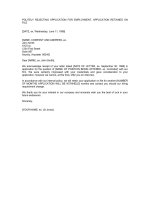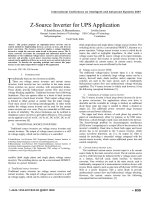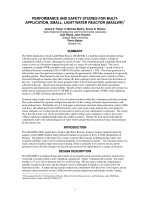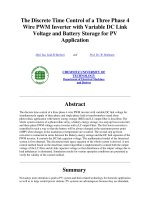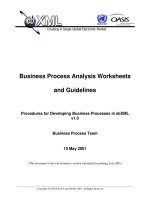Guidelines CRC for Online Application FINAL
Bạn đang xem bản rút gọn của tài liệu. Xem và tải ngay bản đầy đủ của tài liệu tại đây (322.51 KB, 8 trang )
Implementation Guidelines
For
Collaborative Research Program for Common Regional Issues (CRC)
Japanese Fiscal Year 2018
ASEAN University Network /
Southeast Asia Engineering Education Development Network (AUN/SEED-Net)
September, 2017
Table of Contents
1.
About AUN/SEED-Net ....................................................................................................................... 1
2.
Program Concepts and Objectives .................................................................................................... 1
3.
Principle Investigator and Team Composition................................................................................. 2
4.
Research Area ..................................................................................................................................... 3
5.
Grant Management ............................................................................................................................. 3
6.
Financial Support................................................................................................................................ 3
7.
Intellectual Property Rights (IPRs) ................................................................................................... 4
8.
Commitment ........................................................................................................................................ 4
9.
Application Process ............................................................................................................................. 5
1. About AUN/SEED-Net
ASEAN University Network/Southeast Asia Engineering Education Development Network
(AUN/SEED-Net) was established in 2001. After 2 years of preparation, full-scale operation started in
March 2003 for 5 years as the Phase 1 cooperation, which was then followed by the Phase 2 and the
Phase 3, supported by Japanese Government through Japan International Cooperation Agency (JICA).
AUN/SEED-Net has proved to succeed in strengthening university-industry relations, improving
research capacities of academic staff in ASEAN Member Countries, and fostering a network of quality
engineering higher-education in the ASEAN region. These were evidenced in collaborative researches,
academic staff exchanges, conferences, and papers published in the “ASEAN Engineering Journal” by
higher degree participants (Master’s degree and/or Doctoral Degree) and academics from Japan. Thus,
continuation of this program in Phase 4 will have the following objectives.
I. Enhance education and research capacities of Member Institutions (MIs) through their
collaboration among ASEAN and Japanese academia
II. Strengthen industrial relations and application
III. Address developmental issues in ASEAN
IV. Improve the quality of higher education through the expansion of ASEAN academic networks
2. Program Concepts and Objectives
The Collaborative Research Program for Common Regional Issues (CRC) aims to improve the
commerciality and cohesiveness of academia research and industrial sector’s needs. Academic
researchers liaise with industry players to understand core regional issues and needs as well as build
rapport. The objectives of the program are as follows:
I. Address ASEAN regional industrial needs by analyzing common critical issues
II. Strengthen academic networks among MIs, Japanese Supporting Universities (JSUs), and
industries
III. Establish and promote joint research activities among MIs, JSUs, and industries
IV. Improve human resources by involving young researchers / graduate students
Collaborative Research Program for Common Regional Issues (CRC) JFY 2018, Page 1 of 5
3. Principle Investigator and Team Composition
Requirement
Type of
Involvement
Description
Quantity
Full-time faculty member of MI as listed in Appendix 1
(excluding MI in Singapore and Brunei)
Japanese nationals are not allowed.
Principal
Investigator [PI]
(Lead researcher for
the grant project)
Compulsory
Take full responsibility of CRC research implementation
throughout the two-year-research period
1
At the time of application, PI must not apply for the
following support from AUN/SEED-Net:
i) Collaborative Research Program for Common
Regional Issues (CRI)
ii) Research Fellowship for Postdoctoral Study (RF)
Co-investigator
(JSU)
Full-time faculty member of JSU as listed in Appendix 1
At least 1
Co-investigator
(MI)
Full-time faculty member of another MI from different
country
At least 1
Full-time faculty member of the same MI as PI
Preferable
Co-investigator
(same MI as PI)
Co-researcher
(MI or Any
university)
Optional
Research Assistant
[RA]
In the event that Principal Investigator (PI) cannot
continue the duty, this person must be PI instead.
Faculty member(s) of any universities or member of
industrial, governmental, or community sector
Current Master’s or Doctoral Degree Programs Students at
the same MIs which PI or Co-investigator (MI) or Coresearcher (only MI) belongs to.
No ceiling
No ceiling
No ceiling
Honorarium is available ONLY for RA who is not a
current AUN/SEED-Net scholar nor Japanese national.
Collaborative Research Program for Common Regional Issues (CRC) JFY 2018, Page 2 of 5
4. Research Area
10 Engineering Fields as listed in Appendix 1
5. Grant Management
5.1. Maximum of US$50,000 for 2 Japanese fiscal years (JFY) which is from April to March
• JFY 2018: from contract date (start from 1 April, 2018) to 15 March, 2019
• JFY 2019: from contract date (start from 1 April, 2019) to 15 March, 2020
5.2. General regulations
• Budget allocation for each JFY is based on the online application form.
• Principal Investigator is required to submit the financial report to AUN/SEED-Net at the end
of each JFY. Failure of submission will result in subsequent disbursement being withheld and
will be cause for scrutiny in the Principal Investigator’s future applications to other
AUN/SEED-Net program.
• Carryover of funds deficit from the JFY 2018 to JFY 2019 is not permitted.
• Expenditure incurred before contract date and/or after 15 March is not claimable.
• Only official bank account of the university to which the applicant belongs, or equivalent, is
applicable. The two-year budget should be managed by the applicant.
• Only research team members of MI as listed in Appendix 1 (excluding MI in Singapore and
Brunei) are eligible to use this grant.
6. Support for 2 Japanese Fiscal Year
Quantity
Description
Reference
Financial Support
Maximum of US$50,000
Using for research expenses in 5 categories;
1) Trip Expense
2) Equipment
3) Consumables/Spare Parts/Others
4) Commissioned Work
5) Honorarium for Research Assistant
Temporary Financial Guidelines as
attachment at />
Japanese Professor Dispatch
Program (JPDP)
6 Slots
Additional travelling support for PI
to invite the academic staff of JSUs
whose names listed on the research
team member
Implementation Guidelines for
Japanese Professor Dispatch Program
(JPDP)
(always refer to the latest version) at
/>
Collaborative Research Program for Common Regional Issues (CRC) JFY 2018, Page 3 of 5
7. Intellectual Property Rights (IPRs)
A written agreement shall be made between the MI(s), to which the Principal Investigator belongs, and
the other concerned parties who are involved in the CRC Project. Agreements must stipulate the
following:
7.1. Rights and ownership to all intellectual property generated by the Project, such as patents, trade
secrets, and copyrights shall be vested on the MI(s) and other concerned parties involved.
7.2. Only by written consent of all parties involved in the research will allow AUN/SEED-Net
and other MI(s) to have the rights to use the research’s IPRs for academic, network purposes, and
publication.
7.3. The MI(s) and other concerned parties are expected to contribute a part of the income generated
by the IPRs resulting from the research fund to AUN/SEED-Net. Details shall be discussed and
agreed upon among concerned parties.
7.4. The MI(s) shall bear full responsibility to make sure that any part of the Project activities or the
outcomes produced by the Project will not infringe upon the IPRs of other parties. In this regard,
AUN/SEED-Net shall bear no responsibility for any disputes or claims on IPRs related to the
Project.
8. Commitment
8.1. PIs are required to submit the Financial Report including Technical Report to AUN/SEED-Net at
the end of each JFY. Failure of submission will result in subsequent disbursement being withheld
and will be cause for scrutiny in the Principal Investigator’s future applications to other
AUN/SEED-Net program.
8.2. In principle, within 1 year of completing the CRC program period, a final publication of the
research outcomes is required to be submitted to the ASEAN Engineering Journal.
8.3. The PIs and research team agree to the condition that AUN/SEED-Net has the right to use photos
of the persons engaged in AUN/SEED-Net activities for advertising or promotional purposes of
PR and reporting without consent for each individual case.
8.4. If a CRC program is found to be improperly conducted, AUN/SEED-Net has the right to terminate
the funding.
Collaborative Research Program for Common Regional Issues (CRC) JFY 2018, Page 4 of 5
9. Application Process
9.1. Apply online at www.seed-net.org/crcapplication2018 by November 26, 2017.
Online application form requires you to upload the following documents;
Online application form requires you to upload the following documents;
□ Form A - Research Proposal
□ Form B - Endorsement Letter with Department Head’s (or above) Signature
□ Form C - Letter/E-mail showing the content of commitment from each Co-investigator
□ Form D - Curriculum Vitae of each research team member
9.2. Before you apply;
• Please download ‘Form A-D’ at />• You can preview the online application questions as attachment at />9.3. Application review data
Submitted applications are reviewed by a reviewing committee whom are experts in the
particular engineering fields assigned by AUN/SEED-Net based on the following review criteria:
• Originality
- The research nature is original and beneficial in the engineering aspect or industrial
practice.
- The research purpose and topic are timely and useful.
• Relevance and feasibility
- The research purpose and topic are relevant to the purpose of CRC.
- The research method is relevant to the purpose and expected outcomes of the research.
- Necessary data, facilities, and equipment are well defined and prepared.
- The budget proposal is reasonable and corresponds to the research nature.
- The research findings have great potential for practical application, use, or development.
• Research organization
- The members of the research are adequate and the roles are clearly assigned to each
member.
9.4. Important tips to improve the quality of proposals:
• Appropriately address how a project is relevant to the concept and the objective of
Collaborative Research Program for Common Regional Issues (CRC)
• Clearly describe purposes of the researches in relation to social needs and future technological
evolution
• Elaborate on research methodology with realistic and feasible schedules
• Logically structure research methodology with concrete planning
Collaborative Research Program for Common Regional Issues (CRC) JFY 2018, Page 5 of 5
Appendix 1
List of Member Institutions (MIs) and Japanese Supporting Universities (JSUs)
List of 10 Engineering Fields
•
•
•
•
•
•
•
•
•
•
Chemical Engineering (ChE)
Civil Engineering (CE)
Computer and Information Engineering (CIE)
Electrical and Electronics Engineering (EEE)
Energy Engineering (EneE)
Environmental Engineering (EnvE)
Geological and Geo-Resource Engineering (GeoE)
Materials Engineering (MatE)
Mechanical and Manufacturing Engineering (ME/Manu)
Natural Disaster (ND)
